The Dead City
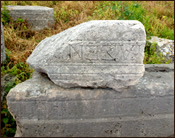 I have been to a dead city. I am not referring to a town that inspires the sentiment of “Marietta’s Lied” from Korngold’s “Die Töte Stadt”; rather, I speak of the Roman city of Perge. It once thrived but now only is home to stray dogs, of which there are many to be seen sleeping amongst the ruins, and tiny black tadpoles in stagnant pools. These residents cannot appreciate the cracked marble which once adorned magnificent facades, the deep cold pool of a Roman bath which once was filled with water and now contains only brown and green moss growing on its floor. They don’t know that it was a place of learning: the famous Greek mathematician Apollonius of Perga once resided there. They have no means to discern that it had significance in the life of St. Paul and his companion St. Barnabas, who preached there twice.
I have been to a dead city. I am not referring to a town that inspires the sentiment of “Marietta’s Lied” from Korngold’s “Die Töte Stadt”; rather, I speak of the Roman city of Perge. It once thrived but now only is home to stray dogs, of which there are many to be seen sleeping amongst the ruins, and tiny black tadpoles in stagnant pools. These residents cannot appreciate the cracked marble which once adorned magnificent facades, the deep cold pool of a Roman bath which once was filled with water and now contains only brown and green moss growing on its floor. They don’t know that it was a place of learning: the famous Greek mathematician Apollonius of Perga once resided there. They have no means to discern that it had significance in the life of St. Paul and his companion St. Barnabas, who preached there twice.
Perge was once one of the wealthiest and most splendid cities in the ancient world. Now the grand avenue now runs towards a bleak horizon, and smashed columns and blocks of stone litter its sides. Only the occasional plinth inscribed with Greek or Latin words or a column with a figure carved into its top provide a discrete clue as to its former residents.
Where are they? Fled, felled by disease, murdered, bred out, died. Gone, long gone. The electricity pylons on the surrounding hills were built by a people who speak a different language and inhabit a land that has vastly changed due to the work of their hands. Their cities are alive; the red flag with white crescent and star flutters over a vibrant nation. The dead city is kept as a monument to their vanished predecessors.
As I walked over broken stones, I wondered how such things happen. After all, the people who lived in the dead city once had everything: food was plentiful, indeed, a wild grape vine was to still be seen. The baths, the focus of Roman life, were large and splendid. Scratch beneath the dirt and magnificent marble tiles where its patrons once walked are to be found. No doubt, the city was once filled with the scents of bread baking, odours of animals and the omnipresent aroma of olive oil. Its streets echoed with voices speaking a variety of tongues: arguing, talking, selling. Eventually, Roman proprietorship shifted to the Byzantine, and afterwards the city lasted well over a millenium. Why did it then die?
The historical record suggests that Perge declined due to Arab raids, and then was gradually abandoned during the Seljuk period. But is there more to it than that? I cannot help but think of the old dictum: hubris turns to nemesis. The moment of victory is the time when the seeds of eventual defeat are sown. The inhabitants of Perge worked to build a magnificent city, which stood as a tribute to effort and invention. But having arrived at that destination, they could not sustain their place at the pinnacle of success. Hubris turned to nemesis: complacency perhaps set in, mismanagement and corruption may have followed thereafter, the quality of leadership probably declined. The Arabs, inspired by the fervour of new-found religious faith might have seen decadence as weakness and brought Perge down. Now all that reigns there is the quiet, apart from the chatter of tourists and their guides, the soft ripples on the water from the tadpoles, the gentle patter of the stray dogs feet.
The desperate sadness I felt at seeing Perge made me glad to leave. It was tremendous comfort to climb into a modern, air conditioned bus and drive away from the site. A lunch by a nearby river, a cold beer, a moment to bask in the sunshine awaited. But I couldn’t escape the thought that what happened to Perge could just as easily be our fate. Antalya bustles with life and construction: I wonder if it is on its way to becoming the Turkish equivalent of Miami. Men sit outside in shirtsleeves under the shade of orange trees and drink thick Turkish coffee while chatting happily to friends. This, end? How could the wide paved roads of Antalya or of London or New York turn into the broken avenues of Perge? How could the shattered skyline of the dead city be transposed onto our modern metropoli?
I cannot know the precise means, but history does have an inescapable logic at work: that which rises, must fall. We may collapse due to a change in the world order, perhaps one as profound as the rise of Islam. The present ascent of China suggests a possibility: maybe the cities we know won’t die in that instance, but change beyond all recognition.
An environmental catastrophe is another potential fate: I recall the pictures which beamed into my television set after the Tōhoku earthquake and tsunami in 2011. A picture of a harbor is burned into my mind: a tide of black water rose and swept all before it, overturning large boats and collapsing river defences. This was a strong reminder that nature has the power to frighten and scatter: while this is not what happened to the dead city, Perge does resemble the remains after a natural catastrophe.
We could simply destroy ourselves. Our technology may run far ahead of our wisdom, and in the process, we could cause a catastrophe which causes life as we know it to stop. Our efforts to manipulate genes could go wrong. Our use of nuclear energy could go haywire. Our desire to embed computers in every nook and cranny of existence could be a recipe for disaster.
However, we just don’t know, and so we cannot prepare. We have only graves and poetry to remind us of our impermanence. Shelley’s immortal words came to me as I looked upon Perge’s shattered agora and overgrown aqueduct: “look upon my works, ye mighty and despair”; they echoed in my mind as the bus climbed a hill and the golden sunlight of a beautiful April afternoon penetrated the dusty windows.
If we accept that our time of glory as a civilisation is as fleeting as life itself, then perhaps we can stop being obsessed by it. I notice that the Americans are still locked into the idea of being “number one” in the world; they believe that their selection of a President this November will somehow make a difference. It may or it may not, but the idea that America can dominate the world in the same manner as it once did is madness: as other nations rose, America’s stature was always going to suffer a relative decline. It’s what you do with your legacy that matters: the Romans left us a legacy of law, literature and culture which remains with us today. Were I to examine every piece I’d ever written, no doubt Roman and Greek DNA would be found in the vocabulary and grammar. The very framework by which I view the world is influenced by the Graeco-Roman tradition that lingers in Western education. Perge is dead, but the legacy of its inhabitants is very much alive. Perhaps rather than worry about how we will remain on top or at least in contention, we should focus on what kind of legacy we leave, how our voices will carry down through the generations. How do we become people whose skylines may one day be shattered and visited only by passing tourists, yet still remembered?

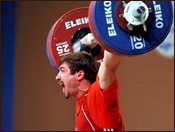 Not far from here, the European weightlifting championships are taking place. This is apparently very important to the Turks: the triumphs of their countrymen Sibel Şimşek and Fatih Baydar are matters of national pride, lauded in newspapers and on television. I watched some of the competition on Eurosport in my hotel room (much to my other half’s chagrin): the camera panned to the crowd whenever a Turkish competitor took to the stage. Flags waved, the crowd roared: I think I saw Mr. Baydar’s mother cheering and praising her son from the stands.
Not far from here, the European weightlifting championships are taking place. This is apparently very important to the Turks: the triumphs of their countrymen Sibel Şimşek and Fatih Baydar are matters of national pride, lauded in newspapers and on television. I watched some of the competition on Eurosport in my hotel room (much to my other half’s chagrin): the camera panned to the crowd whenever a Turkish competitor took to the stage. Flags waved, the crowd roared: I think I saw Mr. Baydar’s mother cheering and praising her son from the stands.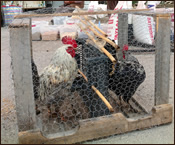 That said, it’s probably not fair to blame solely the aristocracy; certainly they are no help. However, yesterday afternoon in a Turkish market, I saw two cockerels locked in a wire cage. I presume that this was not for the purpose of serving them for dinner later. Dog racing is not a particularly posh activity, nor is badger baiting. It may be that there is a terribly ugly streak in human nature which suggests that we treat the gifts of the earth as our property rather than something that is on loan while we reside here.
That said, it’s probably not fair to blame solely the aristocracy; certainly they are no help. However, yesterday afternoon in a Turkish market, I saw two cockerels locked in a wire cage. I presume that this was not for the purpose of serving them for dinner later. Dog racing is not a particularly posh activity, nor is badger baiting. It may be that there is a terribly ugly streak in human nature which suggests that we treat the gifts of the earth as our property rather than something that is on loan while we reside here.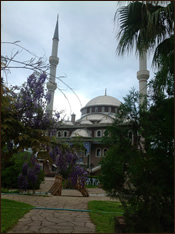 There’s nothing quite like the Muslim call to prayer. I heard it earlier this afternoon while walking through an open air market. The air was full of the sharp scent of citrus, the earthy smell of fresh vegetables, and the spiky odour of fish out on display. Mothers and grandmothers manned their stalls, haggling with patrons and keeping an eye on children who played at their feet. Chickens strutted and clucked in the background. The occasional stray cat poked his nose around corners. A small boy in a red sweater snuck his hand into a tray full of green almonds, snatched a prize and his diminutive naughty face broke into a smile as he devoured his treat. Then the voice of the muezzin rang out true and clear from the silver, white and lilac mosque: his voice didn’t waver, but wrapped around the Arabic words in a close, loving embrace. I don’t speak Arabic, but I did catch references to Allah; there was no mistaking the praise for Him from all His creation.
There’s nothing quite like the Muslim call to prayer. I heard it earlier this afternoon while walking through an open air market. The air was full of the sharp scent of citrus, the earthy smell of fresh vegetables, and the spiky odour of fish out on display. Mothers and grandmothers manned their stalls, haggling with patrons and keeping an eye on children who played at their feet. Chickens strutted and clucked in the background. The occasional stray cat poked his nose around corners. A small boy in a red sweater snuck his hand into a tray full of green almonds, snatched a prize and his diminutive naughty face broke into a smile as he devoured his treat. Then the voice of the muezzin rang out true and clear from the silver, white and lilac mosque: his voice didn’t waver, but wrapped around the Arabic words in a close, loving embrace. I don’t speak Arabic, but I did catch references to Allah; there was no mistaking the praise for Him from all His creation.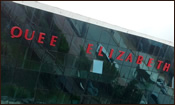 In the city of Antalya itself, it appeared that every last portion of commercial space was crammed with shops. Virtually any good or service that one wanted, whether it was an Efes pilsner or a Turkcell phone was on offer. And despite it being late afternoon, there was no indication that the commercial activity was tailing off for the day. It doesn’t matter if a few sparks fly or if too many hotels are being built in the vicinity of Göynük, of if the Queen Elizabeth hotel in Göynük centre has lost the “N” on its sign and the fountain pumps don’t work fully leaving the hotel resting in a stagnant pool – there is an energy and dynamism that shows that the nation is pushing ahead. I have no doubt that the N will be put back, the pumps repaired or the hotel will be simply demolished and replaced with another, which will be bigger and better.
In the city of Antalya itself, it appeared that every last portion of commercial space was crammed with shops. Virtually any good or service that one wanted, whether it was an Efes pilsner or a Turkcell phone was on offer. And despite it being late afternoon, there was no indication that the commercial activity was tailing off for the day. It doesn’t matter if a few sparks fly or if too many hotels are being built in the vicinity of Göynük, of if the Queen Elizabeth hotel in Göynük centre has lost the “N” on its sign and the fountain pumps don’t work fully leaving the hotel resting in a stagnant pool – there is an energy and dynamism that shows that the nation is pushing ahead. I have no doubt that the N will be put back, the pumps repaired or the hotel will be simply demolished and replaced with another, which will be bigger and better.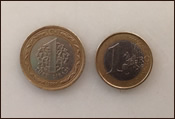 I can find another bit of evidence by opening my wallet. There are striking similarities between the 1 Turkish Lira coin and the 1 Euro coin. Furthermore, most merchants in this area will take Euros just as readily as they take Turkish money: one shopkeep told me how he and his colleagues wanted to serve “Europäisch” customers (As a student of the German language, I’ve found it interesting how German and English cross over each other here). However, lately, most of the tourists were Russian.
I can find another bit of evidence by opening my wallet. There are striking similarities between the 1 Turkish Lira coin and the 1 Euro coin. Furthermore, most merchants in this area will take Euros just as readily as they take Turkish money: one shopkeep told me how he and his colleagues wanted to serve “Europäisch” customers (As a student of the German language, I’ve found it interesting how German and English cross over each other here). However, lately, most of the tourists were Russian.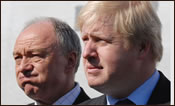 I don’t think anyone ever thought there was much love lost between Boris Johnson and Ken Livingstone.
I don’t think anyone ever thought there was much love lost between Boris Johnson and Ken Livingstone. 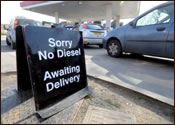 What a difference a panic makes. Last Thursday, I decided I’d go shopping on my way home. As I approached the turn, I noticed that there was a queue of cars going the same way; they were coming in from every conceiveable direction. Reluctantly, I joined the stuttering, coughing procession and turned up Radio 3 to pass the time. After all, it was a bright afternoon and there were worse places to be than behind the wheel.
What a difference a panic makes. Last Thursday, I decided I’d go shopping on my way home. As I approached the turn, I noticed that there was a queue of cars going the same way; they were coming in from every conceiveable direction. Reluctantly, I joined the stuttering, coughing procession and turned up Radio 3 to pass the time. After all, it was a bright afternoon and there were worse places to be than behind the wheel.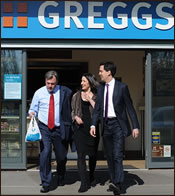 Cities like Bradford suffer from such despair that they are willing to turn to the likes of George Galloway, a human megaphone, in the hopes of being heard. Yet the media’s attention has mostly been transfixed by an entirely imaginary and avoidable fuel shortage. The Labour Party has abdicated from its responsbility as the opposition by focusing its attention on how Cornish pasties are going to be taxed more, provided they’re served above ambient temperature. The hobgoblins dance and weave and do pirouettes in front of the television cameras, while the giants of want, greed and neglect ravage the land. When a seismic event such as the Bradford West by-election happens, the leaders of both the Conservatives and Labour try to dismiss it as a one off: the current spin is that Galloway is a formidable campaigner whose ideas found a willing audience with both “young Muslims” and “Muslim women”. Of course, Bradford West is a diverse constituency and the Muslim vote alone can’t explain his 10,000 plus majority, but never mind. Look at the pasty tax, look to the fuel shortage: don’t look at genuine poverty and true grievance. Stick to existing arrangements and vote Labour if you’re in an industrial town or Conservative if in an affluent suburb: the present order must be preserved.
Cities like Bradford suffer from such despair that they are willing to turn to the likes of George Galloway, a human megaphone, in the hopes of being heard. Yet the media’s attention has mostly been transfixed by an entirely imaginary and avoidable fuel shortage. The Labour Party has abdicated from its responsbility as the opposition by focusing its attention on how Cornish pasties are going to be taxed more, provided they’re served above ambient temperature. The hobgoblins dance and weave and do pirouettes in front of the television cameras, while the giants of want, greed and neglect ravage the land. When a seismic event such as the Bradford West by-election happens, the leaders of both the Conservatives and Labour try to dismiss it as a one off: the current spin is that Galloway is a formidable campaigner whose ideas found a willing audience with both “young Muslims” and “Muslim women”. Of course, Bradford West is a diverse constituency and the Muslim vote alone can’t explain his 10,000 plus majority, but never mind. Look at the pasty tax, look to the fuel shortage: don’t look at genuine poverty and true grievance. Stick to existing arrangements and vote Labour if you’re in an industrial town or Conservative if in an affluent suburb: the present order must be preserved.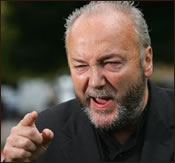 George Galloway shouldn’t be a Member of Parliament. Apart from his overblown theatrics, his comic turn as a cat on Big Brother, and his incessant desire for the limelight, he simply is not an effective representative for his constituents.
George Galloway shouldn’t be a Member of Parliament. Apart from his overblown theatrics, his comic turn as a cat on Big Brother, and his incessant desire for the limelight, he simply is not an effective representative for his constituents. 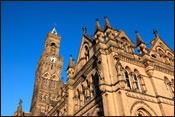 It is generally far easier to criticise than to praise; however the reverse is true at the advent of Spring. Perhaps it’s due to sunlight coming in at a more direct angle, the dawn being brighter, the days being longer. Perhaps it’s because of the evenings during which cool, rather than cold, breezes sweep across the back porch and the bedroom windows are kept open: this means when the morning hour comes, birdsong wafts in. The cherry tree in which the birds’ nest resides has adorned itself in white and pink blossoms.
It is generally far easier to criticise than to praise; however the reverse is true at the advent of Spring. Perhaps it’s due to sunlight coming in at a more direct angle, the dawn being brighter, the days being longer. Perhaps it’s because of the evenings during which cool, rather than cold, breezes sweep across the back porch and the bedroom windows are kept open: this means when the morning hour comes, birdsong wafts in. The cherry tree in which the birds’ nest resides has adorned itself in white and pink blossoms. So the earth renews, invites, becomes more gentle, and beckons us out of doors. My cats Amelia and Sarah Jane are not immune: last night, I let Amelia out the back door. She paused before leaping out; she sniffed the air as if she was appreciating it, and then bounded over the garden fence with a running leap. She came back later, yawning, and then curled up in the spare bedroom: sleep is easier for both cats and humans, perhaps, because one is merely drifting off to dreams rather than fighting against the chill. No doubt her dreams were punctuated by chasing more birds and sitting quietly, as is her wont, amidst verdant plant life.
So the earth renews, invites, becomes more gentle, and beckons us out of doors. My cats Amelia and Sarah Jane are not immune: last night, I let Amelia out the back door. She paused before leaping out; she sniffed the air as if she was appreciating it, and then bounded over the garden fence with a running leap. She came back later, yawning, and then curled up in the spare bedroom: sleep is easier for both cats and humans, perhaps, because one is merely drifting off to dreams rather than fighting against the chill. No doubt her dreams were punctuated by chasing more birds and sitting quietly, as is her wont, amidst verdant plant life. I remember 1997. I know what it was like to live under the last Conservative government. I recall when “Tory” and “sleaze” were synonymous. I recollect with disgust the antics of Neil and Christine Hamilton, Graham Riddick and David Tredinnick and “Cash for Questions”. I also remember Jonathan Aitken and Jeffrey Archer perjuring themselves and going to prison.
I remember 1997. I know what it was like to live under the last Conservative government. I recall when “Tory” and “sleaze” were synonymous. I recollect with disgust the antics of Neil and Christine Hamilton, Graham Riddick and David Tredinnick and “Cash for Questions”. I also remember Jonathan Aitken and Jeffrey Archer perjuring themselves and going to prison.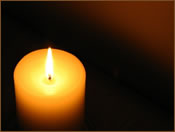 From time to time, I look over my shoulder. Along with years, experience and memories, I have accrued mistakes and sometimes those errors have been associating with people I shouldn’t have. As a result, I find that it’s best to check if someone is sneaking up behind me, just in case they’re ready to deliver a nasty surprise.
From time to time, I look over my shoulder. Along with years, experience and memories, I have accrued mistakes and sometimes those errors have been associating with people I shouldn’t have. As a result, I find that it’s best to check if someone is sneaking up behind me, just in case they’re ready to deliver a nasty surprise. I'm a Doctor of both Creative Writing and Manufacturing and Mechanical Engineering, a novelist, a technologist, and still an amateur in much else.
I'm a Doctor of both Creative Writing and Manufacturing and Mechanical Engineering, a novelist, a technologist, and still an amateur in much else.




